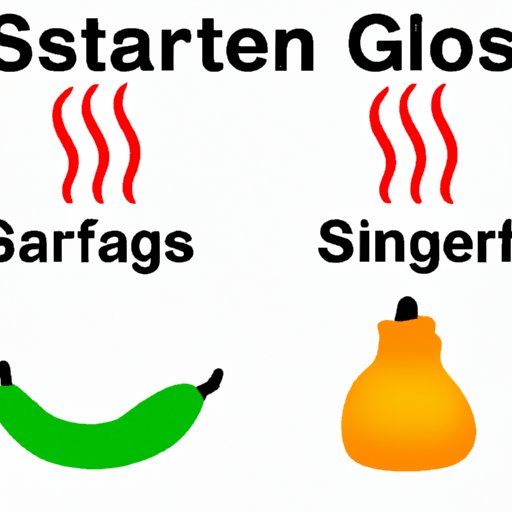
Introduction
Flatulence, commonly known as passing gas, is a natural and common bodily function. While it might seem embarrassing, flatulence serves a vital biological function, aiding in the digestion process. However, certain foods and eating patterns can cause excessive flatulence and even leave you feeling uncomfortable and bloated. This article aims to provide insights into the foods that cause flatulence, why they do, and how to alleviate the issue.
Understanding Flatulence
Flatulence refers to the release of gas from the digestive system through the rectum and anus. The gas typically consists of nitrogen, oxygen, carbon dioxide, methane, and trace amounts of other gases. Flatulence happens when the digestive system is unable to break down certain carbohydrates and fibers, allowing gut bacteria to ferment them. The resulting gas is then released from the body as flatulence. Despite its unpleasant nature, flatulence serves an important purpose by helping the digestive system maintain healthy gut flora and functioning.
6 Surprising Foods That Might Be Causing Your Flatulence!
While some foods like beans and broccoli are known to cause flatulence, other commonly consumed foods can also exacerbate the issue. Dairy, for instance, causes flatulence in some people, especially those who are lactose intolerant. Onions, garlic, and some spices can also contribute to flatulence. Drinking carbonated beverages can further add to the issue since they release carbon dioxide gas in the body. Even certain fruits, such as apples and pears, contain fructose, a sugar that can lead to gas and bloating.
Foods That Make You Fart: Are They All Bad for You?
While most foods that cause flatulence are unhealthy, not all flatulence-inducing foods should be avoided. Foods like beans, lentils, and whole grains are rich in fiber, vitamins, and minerals, and contribute to a healthy diet. Fermented foods such as yogurt and kefir contain probiotics that can help your gut flora. However, if you experience excessive flatulence, it is always best to consult a dietician to determine what fruits, vegetables, and grains work for you.
The Science Behind Flatulence: Which Foods Are the Culprits?
Flatulence is commonly caused by carbohydrate fermentation in the gut. This occurs when carbohydrates present in food are not broken down entirely during digestion. The undigested carbohydrates then become available for bacteria to digest, leading to the production of gases, including hydrogen, methane, and carbon dioxide. Foods high in sugars like fructose and lactose are known to exacerbate the issue. Foods containing high levels of resistant starches, such as potatoes and rice, also contribute to flatulence.
Embarrassed by Passing Gas? Here’s What You Need to Know About Your Diet!
Modifying your diet is an excellent way to reduce flatulence. When it comes to flatulence, moderation is the key. For example, if you are a lover of beans and lentils, consider soaking and cooking them correctly. This process lessens the flatulence-causing properties and makes them more digestible. You can also try incorporating probiotic and fiber-rich foods, such as yogurt and oatmeal, into your diet. Drinking plenty of water and exercising regularly also help to decrease flatulence.
Top 5 Fart-Inducing Foods – And Some Fast Remedies!
Some of the most notorious flatulence-inducing foods include beans, cabbage, carbonated drinks, onions, and broccoli. While avoiding these foods entirely can be difficult, quick remedies like drinking ginger tea, chamomile tea, or taking activated charcoal supplements can help alleviate the symptoms of flatulence. Drinking a glass of warm water with some lemon juice or apple cider vinegar can also reduce the effects of flatulence.
Passing Gas: How Your Body Responds to Certain Foods and Nutrients
While the effects of flatulence vary from person to person, there are specific nutrients that contribute to the problem. Foods high in fat, especially fried foods, take longer to digest and can lead to flatulence. Processed foods, including artificial sweeteners and sugar alcohols, can also cause flatulence. Other nutrients that can contribute to flatulence include fiber, particularly insoluble fiber, which ferments in the gut, leading to excessive gas.
Flatulence from Food: The Dos and Don’ts of a Healthy Digestive System
A healthy digestive system is crucial to reducing flatulence. Avoiding eating too quickly, smoking, and chewing gum are simple dos and don’ts that can help reduce flatulence. Additionally, it is essential to chew your food thoroughly, which promotes easy digestion. Regular exercise and drinking enough water can also help keep your digestive system healthy. Eating probiotic and fiber-rich foods, along with fruits and vegetables can also minimize the symptoms of flatulence.
Conclusion
Flatulence is a natural and common bodily function that serves an essential biological purpose. Nevertheless, excessive flatulence can be uncomfortable and embarrassing. This article has provided insights into the foods that can cause flatulence, why they do, and how to alleviate the issue. Understanding your diet, modifying it accordingly, and incorporating a healthy lifestyle is key to preventing excessive flatulence. By following the dos and don’ts in this article, you can take control of your digestive health and reduce the effects of flatulence.





